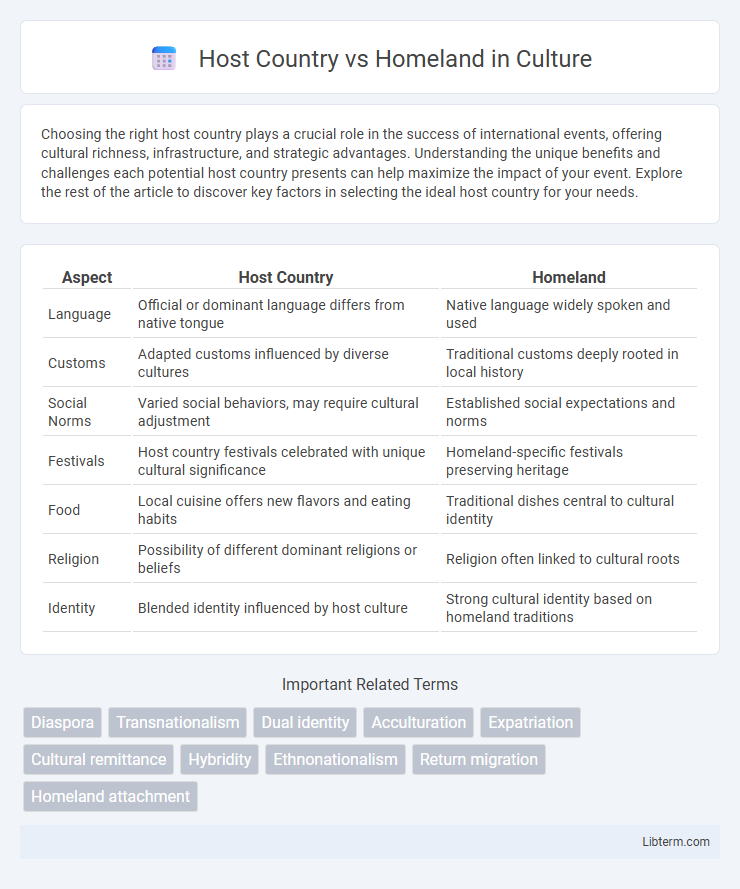Choosing the right host country plays a crucial role in the success of international events, offering cultural richness, infrastructure, and strategic advantages. Understanding the unique benefits and challenges each potential host country presents can help maximize the impact of your event. Explore the rest of the article to discover key factors in selecting the ideal host country for your needs.
Table of Comparison
| Aspect | Host Country | Homeland |
|---|---|---|
| Language | Official or dominant language differs from native tongue | Native language widely spoken and used |
| Customs | Adapted customs influenced by diverse cultures | Traditional customs deeply rooted in local history |
| Social Norms | Varied social behaviors, may require cultural adjustment | Established social expectations and norms |
| Festivals | Host country festivals celebrated with unique cultural significance | Homeland-specific festivals preserving heritage |
| Food | Local cuisine offers new flavors and eating habits | Traditional dishes central to cultural identity |
| Religion | Possibility of different dominant religions or beliefs | Religion often linked to cultural roots |
| Identity | Blended identity influenced by host culture | Strong cultural identity based on homeland traditions |
Introduction to Host Country vs Homeland
Host country refers to the nation where immigrants, expatriates, or temporary residents live and work, while homeland is the country of origin or native country to which individuals feel a strong cultural, historical, or emotional connection. Understanding the distinctions between host country and homeland is crucial for navigating identity, integration processes, and transnational relationships. Research in migration studies highlights the impact of these dual affiliations on social adaptation, economic participation, and psychological well-being.
Defining Host Country and Homeland
Host country refers to the nation where an individual resides temporarily or permanently, often for work, study, or refuge, distinct from their country of origin or citizenship. Homeland denotes the original country or territory where a person was born or to which they have ancestral, cultural, or national ties. Understanding the distinctions between host country and homeland is crucial in migration studies, international law, and cultural identity frameworks.
Cultural Differences and Adaptation
Cultural differences between a host country and homeland significantly impact the adaptation process for immigrants, involving language barriers, social customs, and value systems. Effective adaptation requires understanding and navigating these cultural nuances to achieve social integration, workplace efficiency, and psychological well-being. Research indicates that cross-cultural competence and community support enhance the ability to reconcile disparities and foster a sense of belonging in the host country.
Economic Opportunities and Challenges
Host countries often provide immigrants with diverse economic opportunities including access to new job markets, higher wages, and entrepreneurial ventures. However, immigrants face challenges such as employment discrimination, underemployment, and recognition of foreign qualifications that can limit economic mobility. Meanwhile, the homeland may struggle with brain drain and reduced workforce productivity but can benefit from remittances and the eventual return of skilled migrants.
Social Integration and Community
Host countries play a crucial role in shaping the social integration of immigrants by providing inclusive policies and community support programs that foster belonging and cross-cultural interaction. Social cohesion is strengthened when immigrants actively participate in local organizations, educational institutions, and civic activities, promoting mutual understanding between the host country population and homeland-origin groups. Successful integration often hinges on access to language education, employment opportunities, and social networks that bridge cultural divides, enabling newcomers to contribute positively to both the host society and their diaspora communities.
Identity and Sense of Belonging
Host country and homeland significantly influence an individual's identity, shaping cultural values, language, and social norms that contribute to self-perception. The sense of belonging often fluctuates as immigrants navigate between preserving homeland traditions and adapting to the host country's environment. This duality creates a complex identity, blending nostalgia for the homeland with experiences in the host country, impacting emotional well-being and community integration.
Language Barriers and Communication
Language barriers in a host country significantly impact effective communication for immigrants, often hindering social integration and access to essential services. Limited proficiency in the host country's dominant language can cause misunderstandings, reduce employment opportunities, and isolate individuals from the local community. Overcoming these barriers through language education and culturally sensitive communication strategies is vital for enhancing interaction between immigrants and the host society.
Legal and Political Rights
Host countries grant foreigners certain legal and political rights such as residency permits and limited voting privileges in local elections, depending on national legislation. In contrast, homelands provide full citizenship rights including constitutional protections, unrestricted political participation, and entitlement to social services. Legal frameworks in host countries often impose restrictions on migrants, affecting their access to employment and political representation compared to the comprehensive rights afforded within their homeland.
Emotional and Psychological Impact
Immigrants often experience a complex emotional and psychological dynamic between their host country and homeland, balancing feelings of belonging and alienation. Attachment to the homeland can evoke nostalgia and identity preservation, while integration into the host country may lead to stress, cultural dissonance, or acculturation challenges. This duality impacts mental health outcomes, influencing self-esteem, anxiety levels, and overall well-being.
Weighing the Pros and Cons
Host country residence offers access to new economic opportunities, cultural experiences, and diverse social networks, enhancing personal and professional growth. Conversely, staying in one's homeland preserves deep-rooted cultural identity, family ties, and familiar social systems, fostering a strong sense of belonging and stability. Evaluating factors such as economic prospects, quality of life, legal rights, and emotional well-being helps individuals weigh the benefits and drawbacks in deciding between a host country and homeland.
Host Country Infographic

 libterm.com
libterm.com